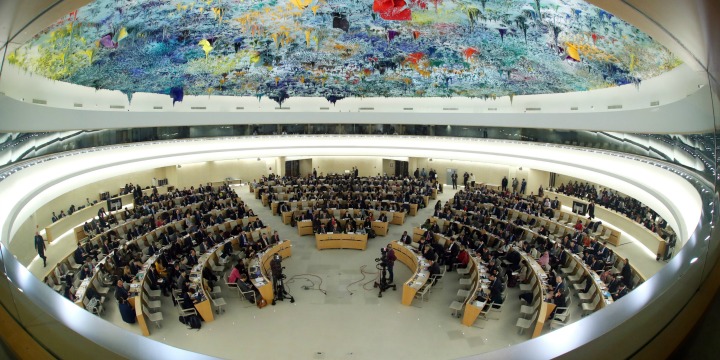US Slams UNHRC’s ‘One-Sided, Biased’ Report Against Israel
 by Israel Hayom / JNS.org
by Israel Hayom / JNS.org

The Human Rights and Alliance of Civilizations Room of the Palace of Nations, in Geneva, Switzerland. The room is the meeting place of the United Nations Human Rights Council. Photo: Ludovic Courtès via Wikimedia Commons.
JNS.org – The US State Department on Tuesday night issued a scathing rebuke of a United Nations Human Rights Council report on the May 2021 Gaza conflict that blamed Israel’s “perpetual occupation” of Palestinian areas for the flare-up.
The State Department reiterated its opposition to the “open-ended and vaguely defined nature” of the UNHRC’s Commission of Inquiry and said it “represents a one-sided, biased approach that does nothing to advance the prospects for peace” between Israelis and Palestinians.
“Israel is the only country subject to a standing agenda item at the HRC and has received disproportionate focus at the HRC compared to human rights situations elsewhere in the world,” the State Department added.
“While no country is above scrutiny, the existence of this [Commission of Inquiry] in its current form is a continuation of a longstanding pattern of unfairly singling out Israel. We re-engaged with and later re-joined the HRC in part to be in a better position to address its flaws, including this one, and we will continue to seek reforms,” it continued.
The commission, headed by former UN Human Rights Chief Navi Pillay, is the first to have an “ongoing” mandate from the UN rights body. Critics allege that permanent scrutiny testifies to an anti-Israel bias in the 47-member-state council and other UN bodies.
The United States quit the UNHRC in 2018 under former President Donald Trump over what it described as its “chronic bias” against Israel, and only fully rejoined this year.
Unusually, as stated, the three-member commission of inquiry has an open-ended mandate, which one diplomat said was already a sensitive issue. “People don’t like the idea of perpetuity,” he said.
Its members are from India, South Africa and Australia.
Israel slammed the report as well, rejecting it as heavily biased in favor of the Palestinians and as “part and parcel of the witch hunt carried out by the Human Rights Council against Israel.”
The Foreign Ministry accused commission members of ignoring Palestinian violence, incitement and antisemitism.
“The Commission members, who claim to be objective, were only appointed to their roles because of their public and well-known anti-Israel stances, in direct opposition to the rules set out by the United Nations,” it said in a statement.
The 18-page report is almost entirely focused on alleged Israeli transgressions and only devotes a few paragraphs to the thousands of rockets and terrorist attacks carried out by Hamas and other Palestinian terrorist groups over the years.
It largely recaps efforts by UN investigators over the years to grapple with the causes of Mideast violence and the authors acknowledged it was in part a “review” of previous UN findings.
“What has become a situation of perpetual occupation was cited by Palestinian and Israeli stakeholders to the commission as the one common issue” that amounts to the “underlying root cause” of recurrent tensions, instability, and protracted conflict, the authors wrote. They said that “impunity” for perpetrators of violence was feeding resentment among Palestinians in the West Bank, Gaza and eastern Jerusalem.
The report’s authors cited “credible” evidence that “convincingly indicates that Israel has no intention of ending the occupation.”
The report also voiced criticism of Palestinian leaders, saying the Palestinian Authority frequently refers to the “occupation” as a justification for its own human rights violations.
While prompted by the 11-day May 2021 conflict, in which 250 Gaza Palestinians and 13 people in Israel died, the inquiry mandate includes alleged human rights abuses before and after that and seeks to investigate the “root causes” of the tensions.
 Palestinian Prime Minister Announces New Reform Package
Palestinian Prime Minister Announces New Reform Package France: Man Suspected of Abducting, Raping Jewish Woman ‘to Avenge Palestine’
France: Man Suspected of Abducting, Raping Jewish Woman ‘to Avenge Palestine’ Israel Intensifies Strikes Across Gaza, Orders New Evacuations in North
Israel Intensifies Strikes Across Gaza, Orders New Evacuations in North Iran Threatens to Annihilate Israel Should It Launch a Major Attack
Iran Threatens to Annihilate Israel Should It Launch a Major Attack ‘Completely Baseless’: Reports of Mass Graves at Gaza Hospitals are False, IDF Says
‘Completely Baseless’: Reports of Mass Graves at Gaza Hospitals are False, IDF Says Columbia University Shutters Campus as Jews Fear for Safety, Critics Call for President to Resign
Columbia University Shutters Campus as Jews Fear for Safety, Critics Call for President to Resign ‘Hamas, We Love You!’ A List of the Chants, Statements From Columbia University’s ‘Gaza Solidarity Encampment’
‘Hamas, We Love You!’ A List of the Chants, Statements From Columbia University’s ‘Gaza Solidarity Encampment’ ‘Useless Pigs’: Anti-Israel Demonstrations Rage at Yale University, Forcing Police Intervention
‘Useless Pigs’: Anti-Israel Demonstrations Rage at Yale University, Forcing Police Intervention Anti-Israel Protesters Interrupt Chelsea Handler Comedy Show Because of Her Support for Jewish State
Anti-Israel Protesters Interrupt Chelsea Handler Comedy Show Because of Her Support for Jewish State Israeli Hostage Families Make Passover Plea for Return of Missing Loved Ones
Israeli Hostage Families Make Passover Plea for Return of Missing Loved Ones



 Israel Intensifies Strikes Across Gaza, Orders New Evacuations in North
Israel Intensifies Strikes Across Gaza, Orders New Evacuations in North France: Man Suspected of Abducting, Raping Jewish Woman ‘to Avenge Palestine’
France: Man Suspected of Abducting, Raping Jewish Woman ‘to Avenge Palestine’ Palestinian Prime Minister Announces New Reform Package
Palestinian Prime Minister Announces New Reform Package Iran Threatens to Annihilate Israel Should It Launch a Major Attack
Iran Threatens to Annihilate Israel Should It Launch a Major Attack